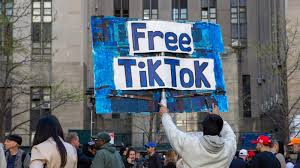ByteDance, the Chinese parent company of the immensely popular video-sharing platform TikTok, has made it unequivocally clear that they have no intentions of relinquishing control over their business, despite mounting pressure from the United States. This firm stance was conveyed through a post on their official Toutiao account, a social media platform under their ownership.
Addressing speculations surrounding the potential sale of TikTok’s US operations, ByteDance firmly refuted such claims, denoting them as “false rumors.” The company’s declaration came as a response to an article by The Information, a technology industry publication, which suggested ByteDance was exploring the possibility of selling TikTok’s US arm, albeit without the core algorithm that powers its functionality.
The enactment of a new law in the United States, compelling ByteDance to either divest TikTok’s US operations or face an outright ban, underscores the escalating tensions between the Chinese tech giant and American authorities. However, ByteDance has opted to challenge the legality of this legislation in court, labeling it as “unconstitutional.”
In an effort to assuage concerns regarding its ties to the Chinese government, TikTok has vehemently denied any undue influence from Beijing. Shou Zi Chew, TikTok’s CEO, reiterated the company’s commitment to defending its rights through legal avenues, asserting confidence in their position based on constitutional grounds.
Despite assertions of independence, ByteDance’s ownership structure remains under scrutiny. While its Chinese founder retains a 20% stake, the majority ownership lies with institutional investors, including prominent US firms such as Carlyle Group, General Atlantic, and Susquehanna International Group. Moreover, a significant portion of the company is owned by its global workforce, with three out of five board members being American.
The geopolitical ramifications of TikTok’s predicament extend beyond corporate boardrooms, with Beijing dismissing concerns over state influence as baseless paranoia. Chinese authorities have warned that any attempt to ban TikTok could result in adverse consequences for US interests.
However, the immediate threat of a ban is tempered by the timeline stipulated in the new legislation. ByteDance has been granted a nine-month window to divest TikTok’s US operations, with an additional three-month grace period before any potential ban can be enforced. This effectively pushes the deadline for a sale into 2025, aligning it with the tenure of the next US president following the 2024 election.


















